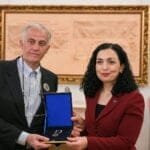Spain has become the ninth member state of the European Union to recognize Palestine. The call to recognize Palestine has received emotional support across Europe, while the massacre of women, children and elderly civilians continues unabated across Gaza.
Palestine is recognized by 140 member states of the United Nations and is an observer member of the UN General Assembly.
It is abundantly clear that recognition of Palestine has had no impact on Israel’s respect for the rule of international law, or has encouraged Hamas to choose the peaceful path of negotiation over the Islamist ideological commitment to exterminate the Jews and destroy the State of Israel.
But diplomatic recognition is always better than claims that a state and a people do not exist. For decades, the United States refused to recognize China until Richard Nixon, advised by a wise European, Henry Kissinger, ended the narrative that Taiwan was the state that ruled the Chinese people.
When Labor came to power, Tony Blair extended diplomatic recognition to North Korea, at a time when the United States insisted that the communist dictatorship there must be abandoned by all allies.
As the British Foreign Secretary who represented the United Kingdom at the EU meeting with the Arab countries, I raised the question of why the Arab states refused to recognize the existence of the State of Israel.
The Arab ministers looked at me like I was crazy. I said that the wisest political leader in Europe for me was Willy Brandt. Why? Because he put an end to the self-defeating doctrine of conservatives in post-war Germany who refused to accept the existence of the German Democratic Republic as a functioning state and that it was better for Bonn to be linked to East Berlin.
We all wish in our dreams that Catalonia accepts the undeniable historical, cultural and civic connection with the rest of Spain.
I have never met a prouder Catalan than Josep Borrell. Together we climbed Mount Canigou.
I have never met a European so committed to the partnership between the people of Spain and the people of his Catalonia.
Francois Mitterrand once said, “Le nationalism, c’est la guerre” – Nationalism is war. We have seen it in Europe, in Ireland, in the Basque Country, in Corsica, in Serbia and today as Israeli nationalism makes war on the people of Palestine and the Islamist nationalism of Hamas makes war on all Jews.
I was born in Scotland, near Glasgow. On my mother’s side, I have Irish blood. I could list every atrocity committed by the supremacist Protestants of England against the Catholics of Ireland.
But today Ireland has found a solution. It is the second richest European country in terms of GDP per capita after Luxembourg. Ireland no longer exports free labor to England.
But the devils of European nationalism still live. What is the Russian occupation of Ukraine but a confirmation of Russian nationalist supremacy over the Ukrainian people?
We have this closest example. Yugoslavia was a serious attempt to erase national identity after 1945. But it needed a communist dictatorship, a secret police and many of the tools of the Franco state between 1945 and 1974.
Today, the last expression of that autocracy and refusal to accept national identity is Serbia. Its leader Slobodan Milosevic tried to impose Serbian nationalism on the rest of the former Yugoslavia. His Serbian supremacist nationalism led to terrible wars, ethnic cleansing, the genocidal killing of 8,000 unarmed men, women and one child, who were tied up and killed by Serbs in Srebrenica.
The Serbian mass killings in Kosovo in 1998-99 forced half of the population to flee as refugees outside of Kosovo to avoid Serbian death squads. Europe’s patience finally broke and European leaders along with President Clinton agreed that military intervention was needed to tame Serbian nationalism.
25 years ago, Spanish air force pilots had the honor of leading the first NATO strikes to end the Serbian nationalist massacre of civilians in Kosovo.
Milosevic was terrible. Once he encountered the determination of a united Europe and USA, he was withdrawn and sent to The Hague to face trial for years of his butchery.
But Serbian nationalism did not disappear. Milosevic’s new press spokesman was Aleksandar Vucic. He is an unparalleled political opportunist today, the president of Serbia, who, like his friend Viktor Orban in Hungary, has turned the country into his personal fiefdom based on media control and corruption. Most educated Serbs leave the country to look for work elsewhere in Europe. Vucic serves as Vladimir Putin’s ambassador to the Western Balkans, to keep this region of Europe in a state of neither war nor peace.
25 years have passed since the brief conflict to liberate Kosovo from Serbian colonial oppression ended. But again Vucic refuses to make peace and insists on the fantasy that Kosovo is simply a breakaway province of Serbia.
Spain helps keep the Western Balkans in a constant state of tension by supporting Vucic’s nationalist ideology that Kosovo is part of Serbia. Unlike other major EU nations – Germany, France, Italy, Poland, the Netherlands and the Nordic states – Madrid refuses to recognize Kosovo and urge Vučić to accept reality.
Spain will recognize Palestine and this will unfortunately have no impact on the Israel-Palestine conflict. But Spain does not recognize a European nation and state, Kosovo, and this keeps a major European region in an unstable state.
The argument that the recognition of Kosovo is a precedent for Catalonia is surreal. France recognizes Kosovo and ignores Corsica’s demands for independence. Britain recognizes Kosovo without any supporters of independence in Scotland using this as an argument to secede from the United Kingdom. Canada recognizes Kosovo and this has no bearing on Quebec separatists’ claims that Quebec cut ties with the rest of Canada.
Spain should be an important actor in Europe’s foreign policy, shaping Europe’s policies towards Latin America. But Madrid’s continued refusal with various governments to be part of the solution to the troubled and unhappy Western Balkans region and instead support for the Vucic regime aligns with the Kremlin’s desire to keep nationalist divisions alive. within the EU, has already expired.
Denis MacShane is the former UK Secretary of State for Europe and North America/.








